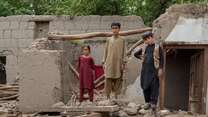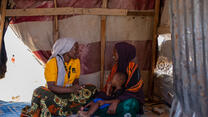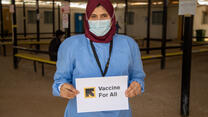There are more displaced people today than at any other point in history with displacement lasting 20 years on average for refugees and more than ten years for the majority of internally displaced persons (IDP). For these vulnerable populations, access to essential, life-saving services including basic healthcare, remains a constant challenge. This indicates the need for long-term, sustainable solutions, rather than short-term fixes.
With health programs in more than 30 countries, the International Rescue Committee (IRC) strives to ensure that those who are experiencing or recovering from conflict and disaster – including refugees, IDPs, and people living in refugee host communities — have access tohigh-quality, affordable health services.
A study, including key informant interviews and a literature review, was conducted in early 2021, looking into ongoing health operations in three challenging contexts – Jordan, Bangladesh and Chad – with the aim of identifying best practices and lessons learned at the policy, financial, and practical levels. In Jordan, dwindling donor funds and limited resources have hindered access to affordable health services for vulnerable refugee and host populations. Health systems strengthening activities coupled with effective community health approaches aimed at improving non-communicable disease (NCD) patient adherence to medication and continuous care, have demonstrated that effective and timely cooperation between government, humanitarian agencies, and donors can yield positive results which more easily transition into long-term solutions.
In Bangladesh, the structural, technical and financial limitations of the national health system – as well as the absence of explicit health policies linked to refugee populations — have resulted in a challenging landscape for both refugee and vulnerable host populations. Capacity building activities led by the IRC and partners to enhance access to Sexual and Reproductive Health (SRH) services have helped young midwifery graduates gain experience in Rohingya refugee camps and go on to join Ministry of Health (MoH) facilities thus strengthening national health systems and improving the quality of care.
In Chad, the government has committed to integrating displaced populations in the national health system but implementation of the policy has been slow — this is also the case with implementation of the Reproductive Health Law. Coupled with human resource shortages, financial barriers and significant challenges linked to climate change, health services remain inaccessible to many, particularly people living in rural areas. The IRC and partners have strived to address these obstacles by working with the government to build health worker capacity, improve infrastructure and equipment, and advocate for implementation of existing policies that expand access to care for all.
The Jordan, Bangladesh and Chad contexts underscore the need to advance evidence-based, inclusive health policies that address the unique needs of vulnerable populations both in the immediate response as well as in long-term planning and financing. This is critical not only for ensuring equitable access to health for all, regardless of documentation status, but also for global and national health security – a principal clearly seen through the COVID-19 pandemic.
Donors, national governments, and implementing organizations should take forward these four overarching recommendations to enhance the health response in any acute or protracted crisis:
FINANCIAL: Donors must allocate long-term, flexible financing to ensure the sustainable provision of quality, affordable and accessible health services throughout the arc of a crisis – from immediate response to long-term recovery and resilience.
STRUCTURAL & LEGAL: Governments and donors must prioritize strengthening national health systems from the onset of any humanitarian health intervention through capacity building of health staff, enhancing health structures and medical resources, and investing in key technologies linked to data, surveillance, and information gathering.
POLITICAL: Governments must develop inclusive national policies that promote equitable access to health services, regardless of legal status. We must also see political will translated into concrete action with the funding needed to implement those policies. For example, refugees and displaced populations must be included in COVID-19 vaccine deployment and distribution plans.
COMMUNAL: Governments and implementing organizations should leverage decentralized community health approaches that empower vulnerable refugee, IDP and host population groups to help effectively address and prevent serious health conditions while also strengthening linkages with the formal health system.
A section has been translated into Arabichere
This report was produced with financial support from The Pfizer Foundation.



